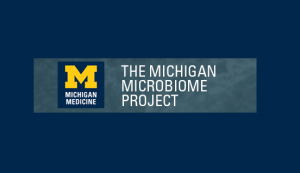Presented By: Michigan Microbiome Project
Microbiome Seminar: Risk factors for Clostridioides difficile infections: beyond antibiotics
Sarah Tomkovich, Ph.D.

Postdoctoral Research Fellow, Lab PI, Schloss lab
Microbiology and Immunology, Michigan Medicine
Hosts:Matthew Ostrowski Ph.D. & Thomas Schmidt, Ph.D.
Abstract: Antibiotics are a major risk factor for Clostridioides difficile infections (CDIs) because of their impact on the intestinal microbiome. However, antibiotics are not the only drugs that alter the microbiome. In human cohorts, we have identified microbiota features that overlap between patients with CDIs or diarrhea, leading to our hypothesis that some patients with diarrhea are susceptible to C. difficile infection but have not been exposed to C. difficile spores. To examine how diarrhea impacts CDI susceptibility, we treated C57Bl/6 mice with 5-day and 1-day doses of 15% polyethylene glycol (PEG) 3350 in the drinking water and then challenged the mice with C. difficile 630 spores. We used clindamycin-treated mice as a control because they consistently clear C. difficile within 10 days post-infection (dpi). We also examined how PEG treatment impacts C. difficile clearance, by administering PEG for 1 day to clindamycin-treated, C. difficile-challenged mice. PEG treatment alone was sufficient to render mice susceptible to CDI and 5-day PEG-treated mice remain colonized for up to 30 dpi. In contrast, 1-day PEG treated mice were transiently colonized, clearing C. difficile within 7 dpi. Although 5-day PEG-treated mice exhibited prolonged C. difficile colonization, we saw no difference in histological inflammation between PEG- and clindamycin-treated mice. Additionally, administering PEG to mice after C. difficile challenge prolonged colonization up to 30 dpi in mice that received PEG immediately after challenge and 15 dpi in mice that received PEG 3 dpi. When we examined microbiota composition across the different treatment groups, we found there were increased Bacteroides and Enterobacteriaceae and decreased Lachnospiraceae and Oscillibacter in most of the PEG-treated mice with prolonged C. difficile colonization. Our findings suggest the osmotic laxative PEG 3350 alters the mouse microbiota and disrupts colonization resistance to C. difficile, as well as clearance in mice with a CDI. Further studies are needed to evaluate if laxatives impact human microbiota colonization resistance.
Microbiology and Immunology, Michigan Medicine
Hosts:Matthew Ostrowski Ph.D. & Thomas Schmidt, Ph.D.
Abstract: Antibiotics are a major risk factor for Clostridioides difficile infections (CDIs) because of their impact on the intestinal microbiome. However, antibiotics are not the only drugs that alter the microbiome. In human cohorts, we have identified microbiota features that overlap between patients with CDIs or diarrhea, leading to our hypothesis that some patients with diarrhea are susceptible to C. difficile infection but have not been exposed to C. difficile spores. To examine how diarrhea impacts CDI susceptibility, we treated C57Bl/6 mice with 5-day and 1-day doses of 15% polyethylene glycol (PEG) 3350 in the drinking water and then challenged the mice with C. difficile 630 spores. We used clindamycin-treated mice as a control because they consistently clear C. difficile within 10 days post-infection (dpi). We also examined how PEG treatment impacts C. difficile clearance, by administering PEG for 1 day to clindamycin-treated, C. difficile-challenged mice. PEG treatment alone was sufficient to render mice susceptible to CDI and 5-day PEG-treated mice remain colonized for up to 30 dpi. In contrast, 1-day PEG treated mice were transiently colonized, clearing C. difficile within 7 dpi. Although 5-day PEG-treated mice exhibited prolonged C. difficile colonization, we saw no difference in histological inflammation between PEG- and clindamycin-treated mice. Additionally, administering PEG to mice after C. difficile challenge prolonged colonization up to 30 dpi in mice that received PEG immediately after challenge and 15 dpi in mice that received PEG 3 dpi. When we examined microbiota composition across the different treatment groups, we found there were increased Bacteroides and Enterobacteriaceae and decreased Lachnospiraceae and Oscillibacter in most of the PEG-treated mice with prolonged C. difficile colonization. Our findings suggest the osmotic laxative PEG 3350 alters the mouse microbiota and disrupts colonization resistance to C. difficile, as well as clearance in mice with a CDI. Further studies are needed to evaluate if laxatives impact human microbiota colonization resistance.